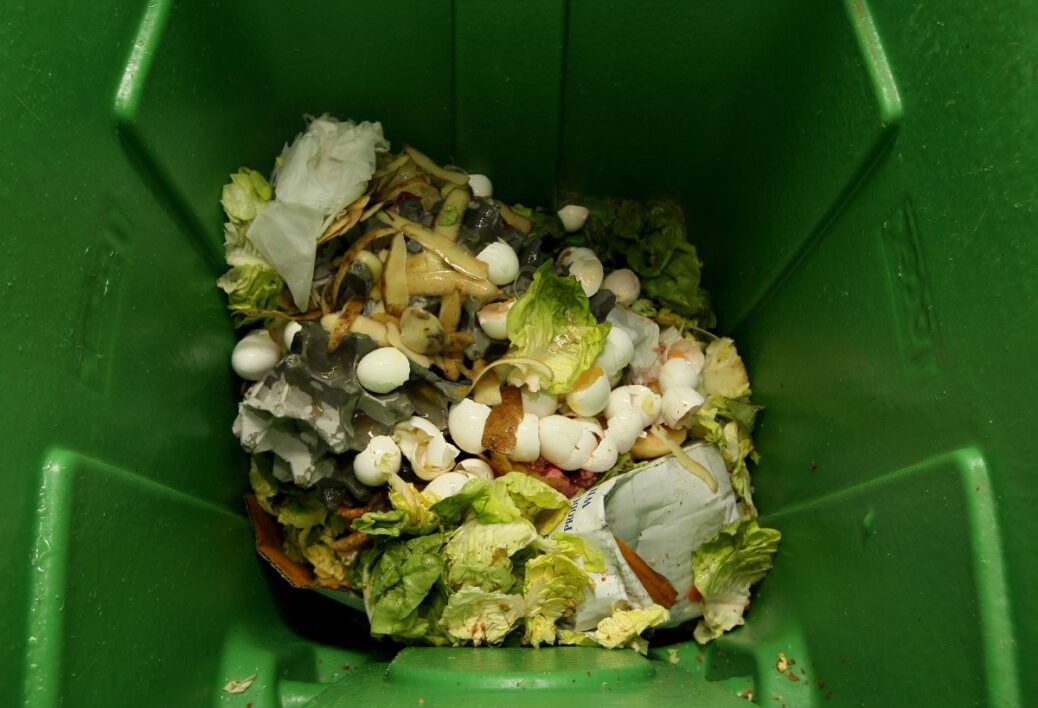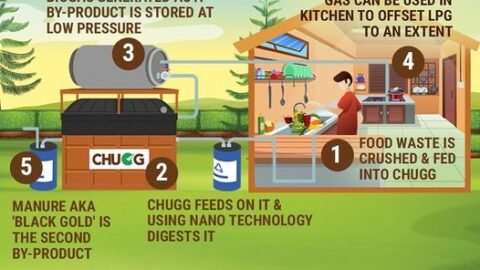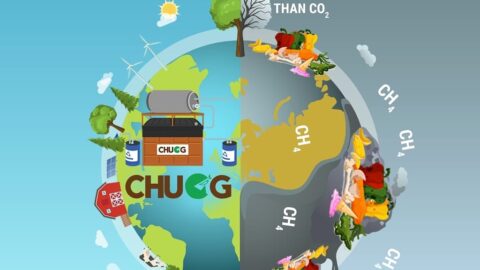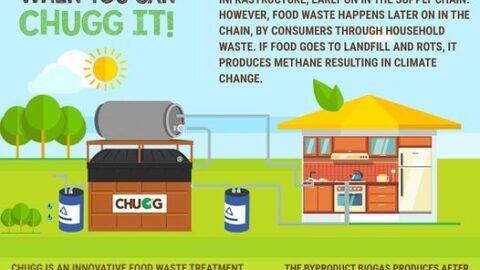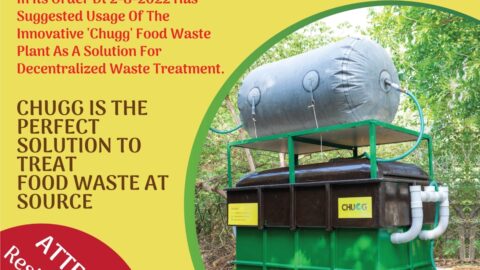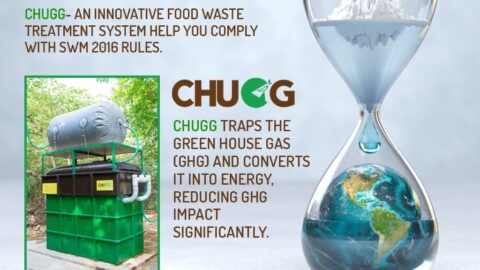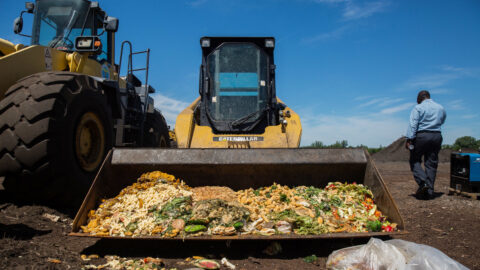Food waste or food loss is the term used for the food that is left uneaten or discarded. About 40% of food produced is wasted by Indians and discarded in landfills. According to statistics, this indicates that the total food wasted equals as much food in the United Kingdom consumes. Food waste not only occurs at the end stage, but also during farming, production, processing, retailing, cooking, and consumption.
Impact of food waste on the Environment
The food waste that occurs in all stages of processing is discarded in landfills. This food waste is sent to landfills where it decomposes to produce Greenhouse gas emissions. A significant portion of wastes dumped in landfills is organic kitchen wastes which decompose to produce Greenhouse gas responsible for climate change and environmental hazard.
This massive layer of organic waste produces Greenhouse gas (Methane) a heat-trapping gas, which is 21 times more potent than Carbon-di-oxide. The food waste that we discard is recyclable and when handled smartly can reduce our carbon footprint, capture renewable energy, and restores the essential nutrients to the soil. Even Municipal bodies are struggling with the increase in waste generated, cost induced, and transporting it to landfills.
Here are smart and environment-friendly ways to recycle organic waste, and reduce the pollution caused by it.
- Convert Food Scraps into Biogas
Do you know that you can make free cooking gas, organic manure, and electricity with everyday organic food wastes? Making Biogas with a food waste treatment system is an efficient way of handling potentially harmful food waste. Cooking with Biogas does not produce smoke hence ideal for household kitchens. Whereas the organic manure produced conditions the soil nutrients back to it. This process reduces the need to cut down trees, and the need for using chemical fertilizers.
How does it work?
Place crushed food waste into a sealed chamber where it digests in the absence of air. The waste will release a gas which can be captured at low pressure and used as fuel for cooking, and as organic manure.
What to recycle?
Vegetable waste, starchy/ sugary fibrous waste, meat, onions, eggs, citrus fruits, and any other food waste can be included. If necessary the waste must be crushed and mixed with water before feeding into the chamber.
There are a lot of Biodigesters available with different functioning and design. Avris offers CHUGG- an innovative food waste treatment system in India for food manufacturing industries, hoteliers, restaurants, gated communities, and to save you from the hassle of waste disposal. The food waste audit conducted by experts in Avris helps you manage waste efficiently without polluting the environment. The amount of Biogas extracted depends on the size of the CHUGG installed. Ideally, CHUGG can produce 4 cum of Biogas from 75kgs of organic food waste.
- Compost kitchen and garden waste
Organic food wastes when composted and added to the soil can help plants grow. Compost is rich in nutrients, light in texture providing the sufficient food your plant needs. Making compost keeps kitchen and garden scraps out of landfills where they take up space and release Greenhouse gas.
How does it work?
Composting is a natural process of decomposition where organic food waste is fed to microbes and breakdown into organic materials. Keeping the microbes population high accelerates the process of composting. Composting requires 3 basic ingredients namely Browns (dead leaves, branches, and twigs), Greens (vegetable waste, grass clippings, fruit scraps, and coffee ground), Water (the right amount of water develops compost).
What to Compost?
Fruits and vegetables, eggshells, coffee grounds and filters, tea bags, nutshells, shredded newspaper, cardboard, paper, yard trimmings, grass clippings, house plants, hay & straw, leaves, sawdust, wood chips, Cotton and wool rugs, dryer and vacuum cleaner unit, hair and fur, ashes.
- Put your waste to good use
If composting is not your thing, then offer your waste to a local framer, or contribute your food waste to your neighbor’s waste pile. Make sure not to dump any meat. Many farmers have large compost pits where you can take the food waste on regular basis for composting. You can even ask the farmer to pick up the organic food waste when they drop by the town to sell goods.
If there is no farmer available find out an organic waste recycling center near your locality. You can even install a recycling bin to throw all your organic food waste. The authorities responsible for collecting the food waste will pick it up once or twice a week.
- Donate waste for animal feed
For decades, animals have been fed with food waste. Feeding food waste to animals reduces pressure on landfills, cattle farmers can save money from buying animal feed, good for the economy, reduces Greenhouse gas emission. Feeding animals with food waste is one of the simple and easiest methods. Many experts say that directly feeding animals with food waste can lead to health issues. It is better to donate your food waste or leftovers to farmers who have cattle who will in turn feed it to their animals.
- Recycle food packaging materials
According to the Environment Protection agency food manufacturing industries, restaurants, grocery stores, and other food-services generate 5,600 tons of total material every day that reaches landfills. Though all food services can get rid of packaging materials at least you can divert them from the landfills to recycling firms.
How does it work?
A waste carton or paper bags can be recycled to paper pulp, and then molded to the desired shape. This can be used for cushioning eggs in an egg tray. This way every food packaging industry can recycle their packaging materials efficiently. If recycling is out of your question, then use recyclable packaging materials. There is no end to the options available in the market when it comes to using recyclable packaging materials.
What to recycle?
Food packaging materials such as wrappers, cartons, containers, glass, metals, aluminum, wood, and many others.
Over the past few years, both public and private sectors are taking corrective measures to process their waste in an environment-friendly manner due to the growing concern on global warming and resource conservation. Installing a food waste treatment system in India for recycling food waste into Biogas is much efficient than composting as it produces different forms of renewable energy that can be used widely. It acts much faster in decomposing food waste than composting.
Use any of the above-mentioned ways effectively to enhance your food waste management process, to divert food waste from landfills, and reducing the emission of Greenhouse gas emission into the atmosphere.
To know about the importance of source segregation Click here

